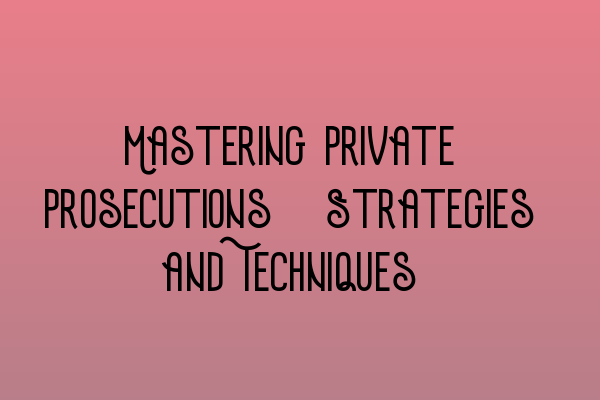Mastering Private Prosecutions: Strategies and Techniques
Welcome to SQE Criminal Law & Practice Law UK. In this blog post, we will delve into the world of private prosecutions and provide you with valuable strategies and techniques to master this complex area of law.
Private prosecutions are a powerful tool available to individuals, organizations, and companies to pursue criminal charges against those who have committed offenses. Unlike public prosecutions, private prosecutions are initiated by private entities and are subject to certain legal frameworks and procedural requirements.
Understanding the Benefits of Private Prosecutions
Before diving into the strategies and techniques, it is crucial to understand the benefits of private prosecutions. Private prosecutions offer individuals and organizations more control over the legal process, allowing them to seek justice in cases where public authorities may not have the resources or inclination to prosecute.
Private prosecutions can also act as a deterrent, sending a strong message to potential wrongdoers and protecting the interests of the private entity involved. Additionally, private prosecutions can provide a platform for victims to have their voices heard and seek compensation for damages suffered.
Strategies for Successful Private Prosecutions
Now, let’s explore some key strategies that can help you master private prosecutions:
- In-depth Case Assessment: Before initiating a private prosecution, conducting a thorough case assessment is essential. Evaluate the evidence, witness statements, and legal considerations to determine the prospects of success.
- Engaging Expert Legal Assistance: Private prosecutions can be complex and require a deep understanding of criminal law. Therefore, partnering with an experienced criminal solicitor specializing in private prosecutions is crucial to navigating the intricacies of the legal process.
- Building a Strong Legal Team: Assembling a skilled and knowledgeable legal team is vital to the success of your private prosecution. Collaborate with expert barristers, paralegals, and investigators to ensure all aspects of the case are thoroughly examined and prepared.
- Effective Evidence Gathering: Robust evidence is the backbone of any successful private prosecution. Implement effective strategies for gathering and preserving evidence, including witness statements, expert opinions, and digital evidence.
- Engaging the Media: Strategic media engagement can help raise awareness of your private prosecution and amplify its impact. Work with PR professionals to craft compelling narratives and successfully communicate your cause to the wider public.
- Navigating Procedural Requirements: Private prosecutions must adhere to specific procedural requirements to ensure their legitimacy. Familiarize yourself with these requirements, such as time limits, disclosure obligations, and court procedures.
- Consideration of Costs: Conduct a careful cost-benefit analysis before embarking on a private prosecution. Such prosecutions can be resource-intensive, so it is essential to assess the financial implications and explore potential avenues for cost recovery where applicable.
Techniques for Effective Private Prosecutions
Alongside the strategies outlined above, certain techniques can enhance the effectiveness of private prosecutions:
- Thorough Legal Research: Undertake comprehensive legal research to identify relevant legislation, precedents, and case law that can support your private prosecution.
- Expert Witness Testimony: Secure testimonies from expert witnesses who can provide specialized knowledge and lend credibility to your case.
- Vigilance in Case Management: Maintain meticulous case management to ensure all deadlines, court filings, and procedural steps are diligently followed.
- Evidence Presentation: Prepare a compelling and organized presentation of evidence to present a strong case before the court.
- Engaging with Key Stakeholders: Foster relationships with relevant stakeholders, such as law enforcement agencies, regulatory bodies, and potential collaborators, to strengthen your private prosecution.
- Regular Case Evaluation: Continuously evaluate the progress of your private prosecution, ensuring that strategies are effective, and adjustments are made when necessary.
Mastering private prosecutions requires a combination of strategic thinking, legal expertise, and a comprehensive understanding of the legal system. By implementing the strategies and techniques outlined above, you can increase your chances of success and achieve your objectives.
For more information on related topics, check out the following articles:
- SQE 1 Practice Exam Questions
- SQE 1 Practice Mocks FLK1 FLK2
- SQE 2 Preparation Courses
- SQE 1 Preparation Courses
- SRA SQE Exam Dates
At SQE Criminal Law & Practice Law UK, we specialize in providing comprehensive legal training and resources to help you excel in your legal career. Contact us today to explore our range of courses and prepare yourself for the challenges of private prosecutions.
